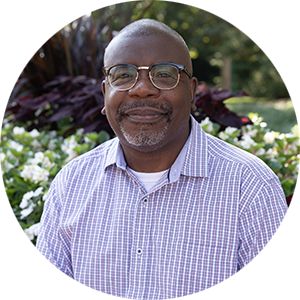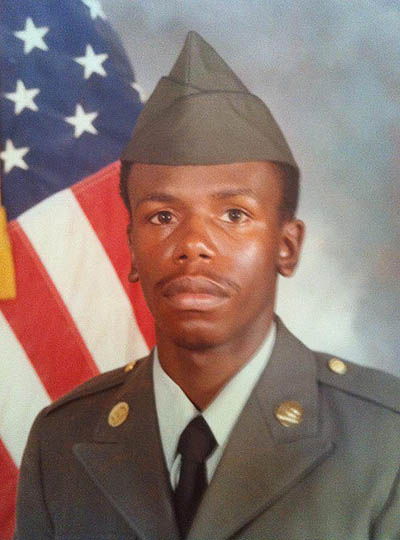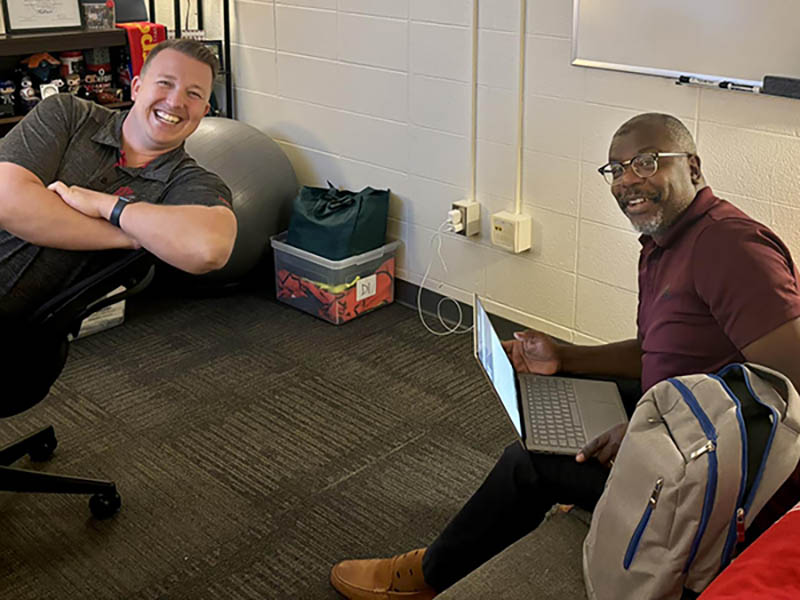‘There’s so much value in helping people’

Tim Stockton
DIRECTOR OF OPERATIONS, IU HOUSING
As the director of operations for IU Housing, Tim Stockton leads a 300-person employee group responsible for the care, cleaning, maintenance, and renovation of all 21 residence halls and apartments on the IU Bloomington campus. Tim cares enough to know what’s going on with the IU community members in his orbit, and he’s always there with a joke, his truck, or a word of advice.
“My boss used to tell us, ‘Don’t let work get in the way of what’s important,’’ Tim said. “The important part is figuring out how we help and support our students, staff, and colleagues.”
Born and raised on a farm in Cave City, Kentucky, Tim served in the U.S. Army for seven years, rising to the rank of sergeant. He later graduated from Western Kentucky University with an undergraduate degree in recreation (1989) and a master’s in education (1992) before landing a position at Teter Quad.
His passion for cycling and working with students made IU the perfect place to settle along with his wife, Sarah Nagy; together, the two have worked at IU for a combined 62 years. Tim has also coached 15 teams for IU’s annual Little 500 Bicycle Race, including Team Major Taylor, named for a world-champion American bicycle racer who became the first internationally acclaimed Black sports star.
Q: What initially led you to Indiana University and what has inspired you to stay?
A: During my master’s at Western Kentucky, I worked with undergrads in the residence halls. I met Bruce Jacobs and Denise Gowan [from IU] at a job fair, and when I came to visit Bloomington, I thought the campus was beautiful. I moved here in 1992 as coordinator for student interaction at Teter Quad. My wife, Sarah, had finished grad school in 1990 and was working in New York at the time. She moved to Bloomington in 1992, and together we’ve put in 62 years as IU employees. Both of our careers, for decades, have been all about supporting students as they transition to campus life and helping them stay on the path to graduation.
My focus on students has expanded over time to include employee success and satisfaction. The members of my leadership team and I work hard to be sure our employees feel appreciated.
Q: What has changed at IU since you got here in 1992?
A: I have seen a lot of changes.
On-campus apartments that were once reserved for married students and families were opened to undergrads in the fall of 2000. We created a new department, Unfurnished Apartment Housing, with its own assignment office and custodial staff. It was our job to figure out how to interest undergrads in the campus apartment option. Recently, three of the older buildings were demolished, so the footprint is smaller now.
In recent years, we’ve unfortunately seen more students struggling with housing and food insecurity. IU does a good job of helping. With colleagues from around campus, we created the Crimson Cupboard food pantry and made sure it had space on campus. The main pantry is in Campus View Apartments at 800 N. Union Street, with a satellite food and hygiene pantry in the IMU, right next to the Biddle Hotel.
Students haven’t changed that much at their core. They want to find community and connection, and to talk about their challenges and goals. I do notice students today are quicker to get to the serious issues they’re dealing with than in the past, especially about mental health.
I still get the same joy from connecting with students and being that listening ear as when I started this work.
Q: What do you want people to know about your work that they may not know?
A: Successfully running an operation this size requires a lot of employees. Our custodial staff, maintenance crews (electricians, painters), interior designers (sewing room), and safety officers work to create a safe environment for students in our living spaces. I’m always so proud of my staff because they care deeply about the student experience—and when something needs to be done, they never ask whose job it is, they just jump in and do it.
Q: What's the best part of your job and why?
A: Working with the staff and students. I enjoy listening to their stories, sharing in their wins, and hearing about their lives—at IU and outside of the university. We have a lot of brilliant people from different backgrounds, and my job is to help them be successful.
My favorite thing is to walk thorough campus and say hi to everyone I pass. Everyone gets an equal opportunity. It drives my son crazy. He’ll say, “Why do you do it when no one says hi back?” I tell him it’s because someone might say it back, even if it’s one person in 100! I’ve gotten into some pretty deep conversations with people on the street.
Q: How does your team’s work intersect with other parts of campus?
A: We have built an infrastructure so students can easily report issues (like power outages). For us, nothing is more important than knowing when a student has an issue that we can resolve. Our staff will almost always respond in less than 24 hours. We have people who work overnight every night, so there’s always someone on duty to support our campus residents. Students can use an online report form for non-emergencies or contact the center desk at any point. I work closely with my great colleagues in the Office of Student Life to be sure we’re all singing from the same sheet of music.
Q: Favorite IU event(s) and time of year?
A: I’m a cyclist, so I love the Little 500. I’ve coached 15 teams or so for Little 5, including Team La Casa, the first women’s Latina team, and Team Major Taylor, which was named for Marshall Walter (aka “Major”) Taylor. He was a cycling champion who was considered the world’s first Black sports star. If Major Taylor were here today, there’d be a shoe named after him!
I believe in the value of supporting colleagues, so I try to attend events and be present where I can. I appreciate IU’s annual Veterans Day flag raising ceremony. I help with check-in for New Student Orientation and attend culture center celebrations and graduation for the Higher Education and Student Affairs master’s at the School of Education. I always volunteer to help Gloria Howell and her crew at the Neal-Marshall with their events. They do an incredible job.
My favorite time of year at IU is when the students come back in early fall. They bring so much energy and enthusiasm to wake up our sleepy town from summer. Last year I was helping with check-in during orientation, and my first customer was one of my former student staff members, who was checking her daughter in to Teter!
 Tim served in the U.S. Army for seven
Tim served in the U.S. Army for seven
years, rising to the rank of sergeant.Q: What do you like to do outside of work?
A: I like bicycles, fixing things … I’m interested in how things work, and how something can come apart and be put back together. Sarah and I like taking short vacations to old industrial towns like Milwaukee, Pittsburgh, and Memphis. We’ll find great restaurants and live music venues and then revisit our favorites when we come back through. Thanks to her, I think I like musicals now. Porgy and Bess was the first musical I liked. The Carole King story was really good, and I liked Chicago, Mama Mia, and Come From Away.
Funny story about how Sarah and I met. I was an undergrad—older than the usual student after seven years in the Army—and she was in grad school. There was a Girl Scout play day for the local Brownie troops. I had the earth ball station. I bounced one of those balls so hard it bounced up and hit her right in the head! The second time I saw her was on the other side of the table for an interview. (I didn’t get the job, but she swears it had nothing to do with that incident.)
Q: What advice do you give people who want to do what you do professionally?
A: First, always treat people with respect. There have been incidents in the past where I was mistreated, so I know how that feels, and how it stays with you. On the other side, I know how easy it is to smile and offer a little bit of your time. There’s so much value in helping people. We can lead by example and in a small way make the world a better place.
When you’re working on a college campus, there’s always a lot to do. I try to figure out where there are gaps and fill them.
The work we do can be stressful and we are often guided by our failures—things that didn’t go the way we wanted them to go. I use that to keep me motivated to do the work I do.
My boss used to tell us, “Don’t let work get in the way of what’s important.” The important part is the people, and figuring out how we help and support our students, staff, and colleagues.






